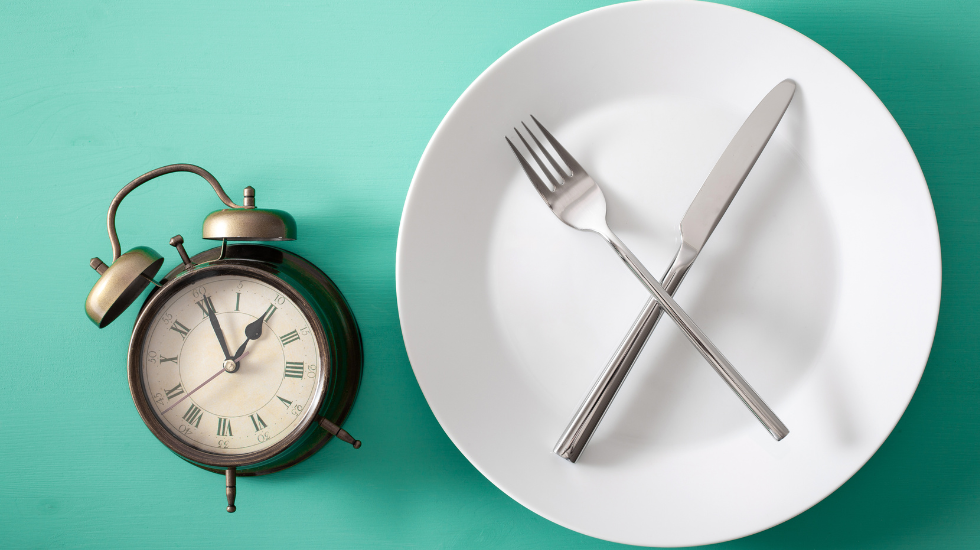Intermittent fasting (IF) has become a popularized wellness practice in recent years, with many experts out there promoting the benefits. Some research suggests it may offer a range of benefits, from improved digestion and metabolism to better blood sugar regulation and even cellular repair.
But with all the buzz, it’s easy to feel pressured into trying it without fully understanding how it works (or whether it’s even right for you)!
There is no one-size-fits-all approach to health.
Just because something works for one person doesn’t mean it’s the best choice for you!
I do want to mention that Intermittent fasting can be especially problematic for women who’ve battled eating disorders. Suddenly, it provides an excuse for starvation. This is, of course, very dangerous!
Your body, lifestyle, and unique needs should always come first! If you’ve ever felt confused about intermittent fasting, my goal is to break it down in a way that empowers you to make the best choice for your own well-being.
The Different Types of Intermittent Fasting
Intermittent fasting can feel overwhelming because there’s no single way to do it. Before I share how the Solluna/Beauty Detox lifestyle naturally incorporates fasting, let’s take a look at some of the most popular methods.
1. The 16/8 Method of Intermittent Fasting
This is one of the most well-known intermittent fasting approaches, and it’s relatively simple: fast for 16 hours and eat within an 8-hour window each day.
If you’re a woman, you might modify this slightly by fasting for 14–15 hours instead of 16 since research suggests prolonged fasting may affect female hormones differently than men’s.
For example, if you finish dinner at 7 PM, you wouldn’t eat again until 11 AM the next day. That means skipping breakfast and focusing your meals within your chosen eating window.
Is This Right for You?
- You naturally don’t feel hungry in the morning and prefer a later first meal.
- You want a structured but flexible fasting schedule.
My Take: If you naturally don’t feel hungry in the morning, this method can be a great way to simplify your eating schedule and give your digestion a break each night! Kapha, or more earth-based Ayurvedic types, would do naturally with this version, as many do not feel hungry in the morning.
2. The 5:2 Diet for Intermittent Fasting
The 5:2 method is a little different—it involves eating normally five days a week and then restricting calories to 500–600 on two non-consecutive days.
Some people prefer to do their low-calorie days back-to-back, while others space them out. The idea is that these two fasting days create an overall calorie deficit without requiring daily fasting.
Is This Right for You?
- You prefer an occasional fasting schedule instead of fasting every day.
- You don’t mind calorie counting on fasting days.
- You have a slower metabolism (Kapha body type in Ayurveda) and tend to feel comfortable with extended fasting.
My Take: Reducing calories two days a week can be easier than daily fasting for some people. However, limiting yourself to only 500–600 calories on fasting days can lead to energy crashes, cravings, and even nutrient deficiencies.
Instead of strict low-calorie days, I suggest having light, nutrient-dense meals with easily digestible foods like soups, salads, and smoothies.
3. Alternate-Day Fasting
This is an extreme method where you fast every other day. Some versions allow for small amounts of food on fasting days, while others require complete fasting.
This is one of the more intense fasting styles, so it’s best for those who already have experience with fasting and feel comfortable going long periods without food.
Is This Right for You?
- Probably not! See my take below!
My Take: I do not recommend this method. Fasting every other day can be extremely difficult to sustain and may cause stress on your hormones, metabolism, and digestive system!
Consistency is key to digestive health, and drastic changes can often do more harm than good!
4. The Warrior Diet
This approach involves fasting all day and eating one large meal at night, typically within a four-hour window. During the day, only small amounts of raw fruits and vegetables are allowed. This diet was created with the idea that ancient warriors ate this way—eating minimally throughout the day and feasting in the evening.
Is it Right For You?
- If you don’t naturally feel hungry until later in the day.
- If you enjoy eating larger meals and prefer to avoid snacking.
My Take: Be careful! Fasting all day and eating only one large meal in the evening goes against natural digestive rhythms and can cause blood sugar imbalances, digestive distress, and overeating at night. Regular meal times can create balance not just physically, but emotionally and mentally. Ayurveda teaches that a decently big meal in the middle of the day, when the sun is at its peak, is great for digestion.
5. Spontaneous Meal Skipping
This is the most natural, intuitive way to approach fasting. Instead of following a strict schedule, you simply skip meals when you’re not hungry or when it feels right for your body.
Is This Right for You?
- Do you prefer flexibility over rigid rules?
- Do you naturally find yourself not feeling hungry in the morning or between meals?
- Does your schedule sometimes make it easier to eat when it works best for you?
My Take: This method is one of my favorites because it encourages you to listen to your body instead of following an external plan.
The key is paying attention to your own rhythms and making choices that truly support your well-being!
The Solluna/Beauty Detox Approach to Fasting
Intermittent fasting doesn’t have to mean extreme restrictions or rigid rules.
Rather than forcing long fasting periods, I focus on morning lightness—giving your body a gentle, natural detoxification period while still providing key nutrients to fuel the day.
My Beauty Detox morning follows this flow:
- Hot water with lemon – Hydrates, alkalizes, and kickstarts digestion.
- SBO Probiotics – Helps populate the gut with beneficial bacteria, supporting digestion and overall gut health.
- Glowing Green Smoothie® (GGS) + Gowing Greens Powder – Packed with vitamins, minerals, fiber, and hydration, this blended drink provides nourishment without burdening digestion.
This approach mimics the benefits of fasting by reducing digestive energy expenditure in the morning while allowing your body to cleanse and repair.
Also, because your digestive fire is highest in midday/afternoon according to Ayurveda, so over-consuming food late at night after eating very little all day is contrary to that principle and will lead to imbalances!
Related Reading: Light to Heavy Eating: A Scientific Approach to Meal Timing
What Does the Science Say About Intermittent Fasting?
Fasting has been widely studied for its potential effects on metabolism, cellular health, and digestion! Here’s what the research shows:
1. Weight Loss
Obviously weight loss is the main reason you might be considering trying intermittent fasting!
When you go without food for an extended period, your body depletes its glucose stores and begins using stored fat for energy instead. This process, known as fat oxidation, is why some people find intermittent fasting helpful for shedding excess weight.
Unlike restrictive diets, it helps reduce overall calorie intake without strict portion control, allowing for a more intuitive approach to eating.
But remember, weight loss isn’t just about when you eat; it’s about what you eat (and digest!)! Pairing fasting with a nutrient-dense, fiber-rich diet supports digestion, energy, and overall well-being. It’s not about deprivation but balance and nourishment.
2. Metabolic Benefits of Intermittent Fasting
Fasting may help improve insulin sensitivity, which means your body uses energy more efficiently and stores less fat. Some studies suggest that fasting can also help regulate blood sugar levels and reduce the risk of metabolic disorders.
Fasting also shifts the body into fat-burning mode by depleting glucose stores and encouraging the use of stored fat for energy.
3. Cellular Repair & Autophagy
One of intermittent fasting’s most exciting benefits is its role in autophagy, a natural process where the body clears out damaged or dysfunctional cells to make way for new, healthier ones.
Think of it as an internal “cleanup” that can help with anti-aging, immune function, and even cognitive health.
4. Reduced Digestive Energy Expenditure
Digestion requires a significant amount of energy! By giving your digestive system a break—whether through fasting or simply eating lighter in the morning—your body can redirect that energy toward repair, detoxification, and overall healing.
This is why many people report feeling mentally sharper and more energized when they give their digestion a little rest.
Related Reading: Healthy Weight and Why Calories Don’t Matter
How Fasting Impacts Gut Health
Your gut microbiome is constantly evolving based on your diet, lifestyle, and habits. So, how does fasting affect it?
Some research suggests that fasting may help reset the gut microbiome, allowing beneficial bacteria to thrive while reducing harmful bacteria populations.
Fasting can also promote a stronger gut lining, reducing inflammation and improving overall digestive health.
Potential Drawbacks of Fasting for the Gut
Your gut is always adapting to what you eat, how you live, and even how you feel. Short-term fasting may help reset your gut microbiome, allowing beneficial bacteria to thrive while giving your digestive system a well-deserved break.
Remember, your gut microbiome thrives on consistency and nourishment.
Fasting too often or for too long can reduce the diversity of beneficial bacteria, which may lead to sluggish digestion, bloating, or constipation when you start eating again!
That’s why gut support is essential. Taking SBO Probiotics daily helps maintain a thriving gut microbiome, even when food intake is limited!
When it’s time to break your fast, Digestive Enzymes ensure your body efficiently absorbs nutrients, easing the transition from fasting to eating. This can be especially helpful if you experience bloating or sluggish digestion after meals.
For a deeper digestive reset, I also recommend Feel Good Detoxy, a gentle but effective cleanse that helps your body naturally eliminate waste and toxins that may build up during fasting!
Related Reading: Everything You Need to Know About Digestive Supplements
Intermittent Fasting: Final Thoughts!
Intermittent fasting should never feel like deprivation. If it leaves you feeling overly hungry, anxious, or fatigued, it’s not the right fit—or you may need to adjust how you’re doing it.
Wellness is about nourishment, not restriction!
Whether you choose to incorporate fasting regularly or just occasionally, the key is to listen to your body and give it the support it needs to thrive.
With love and nourishment,







I welcome that you emphasized the importance of listening your body above all. Even though intermittent fasting is probably easier to follow since it’s not a traditional diet that restricts what you eat, rather when you eat it, not everyone can follow it. It’s like with any diet, weight loss is influenced by almost an unlimited number of different factors. Some studies have shown that while IF can improve insulin sensitivity levels for men, it can actually have the opposite effect for women and worsen their control of their blood sugar levels. You mentioned eating disorders, but there are also medical conditions that can make fasting a bad idea. All in all, listening to your body is the most important thing! Thank you for sharing.
Thank you Michael…appreciate your feedback! ;)